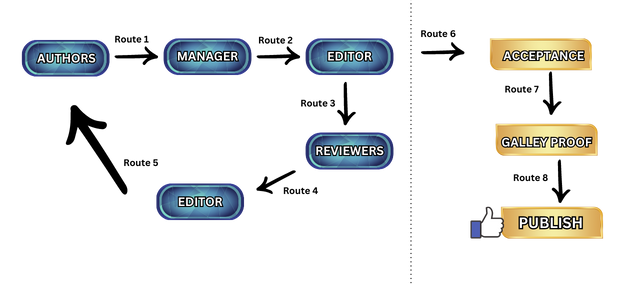PEER REVIEW PROCESS
The manuscript submission process for Public Policy: Jurnal Ilmu Sosial dan Kebijakan follows several steps to ensure a thorough and unbiased peer-review process:
-
Manuscript Submission: Authors submit their research articles to the journal, after which the Editor in Chief assigns the manuscript to the Managing Editor for further handling.
-
Manuscript Check and Selection: The Managing Editor and editorial team perform an initial check and selection process. They may accept the manuscript directly, reject it, or decide to proceed with the review. Additionally, a plagiarism check using Turnitin is conducted for each submitted manuscript.
-
Manuscript Reviewing Process: The Managing Editor requests at least two experts in the field to review the manuscript. The peer-review process is conducted as a double-blind review, meaning the identities of both the reviewers and authors are concealed from each other. Reviewers are provided with a review form provided by Public Policy: Jurnal Ilmu Sosial dan Kebijakan.
-
Notification of Manuscript Acceptance, Revision, or Rejection: Based on the feedback received from the reviewers, the Editor in Chief informs the author of the manuscript's acceptance, the need for revision, or rejection. This communication is done while maintaining the anonymity of the reviewers.
-
Paper Revision: If revisions are requested, the author is given the opportunity to revise the manuscript based on the comments and suggestions provided by the reviewers. The author may also submit a response letter addressing each comment and explaining the changes made.
-
Revision Submission based on Reviewer Suggestion: After making the necessary revisions, the author resubmits the revised manuscript following a similar submission route as in step 1.
-
Notification for Acceptance: If the reviewer is satisfied with the revisions, the editor notifies the author of the manuscript's acceptance for publication.
-
Galley Proof and Publishing Process: The accepted manuscript undergoes the galley proof stage, where formatting, copyediting, and proofreading are performed. After finalizing these processes, the paper is published, either in print or online, as per the journal's publishing format.
It's important to note that the steps outlined above represent one round of the peer-review process. The Editor in Chief and the editorial board carefully consider the feedback provided by the peer reviewers to arrive at a decision. The possible decisions include:
- Accepted as it is: The manuscript is accepted for publication in its original form.
- Accepted with Minor Revisions: The manuscript is accepted, and the author is requested to make small corrections within a specified timeframe.
- Accepted with Major Revisions: The manuscript is accepted, but the author is required to address the changes suggested by the reviewers and/or editors within a specified timeframe.
- Resubmit (Conditional Rejection): The journal is open to reconsidering the manuscript in another round of decision-making after the authors make significant revisions.
- Rejected (Outright Rejection): The journal decides not to publish the manuscript, even if major revisions are made.
Peer Review Process Flow
Detailed information about the flow for the manuscript submission (author) to the acceptance by the editor is shown in the following figure.

In short, the steps are:
- Manuscript Submission (by author) (route 1)
- Manuscript Check and Selection (by manager and editors) (route 2). Editors have a right to directly accept, reject, or review. Prior to further processing steps, plagiarism check using Turnitin is applied for each manuscript.
- Manuscript Reviewing Process (by reviewers) (route 3-4)
- Notification of Manuscript Acceptance, Revision, or Rejection (by editor to author based on reviewers comments) (route 5)
- Paper Revision (by author)
- Revision Submission based on Reviewer Suggestion (by author) with the similar flow to point number 1 (route 1)
- If the reviewer seems to be satisfied with revision, notification for acceptance (by editor). (route 6)
- Galley proof and publishing process (route 7 and 8)









